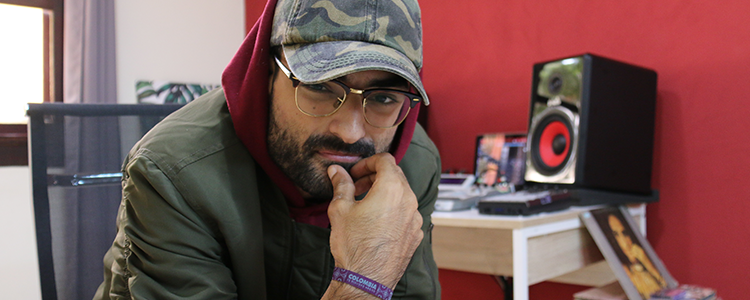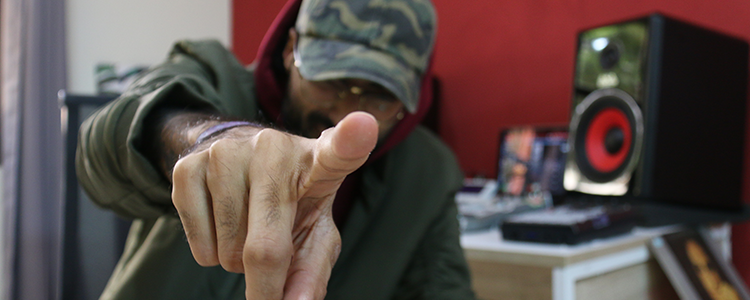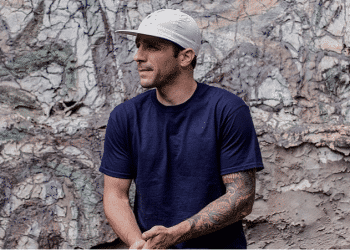Ntourage came up off the internet.
The success he’s seen to date is all online-driven, and it’s a reminder of how the internet has forever decentralized the modern hip-hop industry. Artists like him no longer need to move to massive industry hubs like New York, London, or in Africa, cities like Lagos and Johannesburg. With the right conditions and the right music, they can now blow up organically despite living in cities that don’t have internationally recognized hip-hop scenes.
For Ntourage – government name: Nicolas Machado – that city is Luanda, the coastal capital of Angola. Luanda is not best known for its hip-hop scene; the port city’s most famous musical exports of the past few decades have been kuduro and kizomba, both of which evolved around Luanda in the late 1970s and the 1980s. Luandan hip-hop artists and producers – particularly those working in niche genres like instrumental hip-hop – have relatively few peers or collaborators within the city. Undeterred, Ntourage has been steadily working out of the city of 2.4 million since beginning his career as a producer back in 2003. His rise within the online instrumental music scene didn’t truly begin until 2013, however. That was the year he first discovered lo-fi hip-hop.
Five years after his initial exposure to the instrumental sub-genre, Ntourage’s beats have become as lo-fi as lo-fi can possibly get. Drenched in vinyl static and with the treble filtered right down, his jazzy instrumentals sound like they’re pumping out of a vintage car stereo on any sound system. But they’re meant to, and their uniqueness has earned Ntourage a rabid Soundcloud following. And while he releases most of his music independently, Ntourage is also part of the ALWAYS PROPER and Radio-Wavs collectives and is regularly featured by key tastemakers like Chillhop Records and Steezyasfuck.
NINETOFIVE reached out to Ntourage a few weeks ago and talked to him about everything from his origins in production, to why he thinks the cartoon aesthetic is misused but still not dead, to the reasons why he never goes crate-digging in Luanda. It’s the first time he’s opened up for an interview, and he had a lot to say to us.
How did you first start producing?
I first got introduced to beat-making in about 2003. Jaime – an old friend of mine who lived in the neighbourhood – was doing beats for local underground rappers and the music he was making caught my interest. So we started hanging out at his place after school, just playing around with Fruity Loops 4 until I eventually got my own copy and started doing my own beats at home. It’s been my passion ever since.
Lo-fi hip-hop didn’t emerge for almost a decade after you started producing. What style of beats were you making in the period between when you started producing and when you found your lo-fi sound?
Back then, I was heavily influenced by groups such as N.W.A, Wu-Tang Clan, and Gang Starr so the beats I made definitely had more of a boom-bap approach to them than the beats I make now. I personally didn’t know about lo-fi until late 2013 when I joined Soundcloud, but I’ve always had a strong connection with jazzy raw hip-hop so I was mind-blown when I heard to these producers putting out rough 90’s remixes with slow-tempos and the dirty cassette tape sound from back then. I instantly fell in love with the sub-genre; it was just divine.

You recently said on Twitter that people ask you for “high-quality” versions of your beats – as if they’re not already exactly how you intend them to be. What do you say to them to shut them down?
I just find it funny, honestly. Most of the people making those requests don’t know the origins of lo-fi; most of the lo-fi you hear today is the result of a handful of producers who have changed the sub-genre by pushing their own cleaner lo-fi style out there. Lo-fi has started becoming less rough throughout the last few years and lately, it’s been going towards a more polished, chill style. So that’s what some cats have been expecting of me lately – that clean digital sound. I have to turn these requests down because the beats I make reflect how I feel at the moment I made them, and I’d hate to jump back and work on old projects exactly because I might not be feeling the way I was back then, so I might mess with it until it has nothing to do with the original idea I had when I did it. I’ve done that plenty of times, so I’m just not interested in that now.
when they ask you for a high quality version of your beats pic.twitter.com/PNDF5o3OVS
— ntourage (@NtourageEphekt) January 31, 2018
The cover art you use for most of your songs is either drawn from old-school cartoons, from photographs of 90’s hip-hop artists, or from film photos of different cities. How did you settle on that as your aesthetic?
Visuals are almost as important as the beats. They help express the song’s vibe, and because my beats have a massive 90’s hip-hop and cartoon influence, it’s only natural that my visual aesthetic is related to those influences. Sometimes, instead of making a beat and then adding a picture that relates to it, I do it the other way around. I’ll find or make the cover art first, and then I’ll try to make a beat out of it – it’s a great source of inspiration to me!
And do you feel like the cartoon aesthetic has been over-used by new producers in the last year?
I wouldn’t say the cartoon aesthetic has been overused in the last year but rather, I’d say it has been misused. The reason I say this is because we’ve got to the point where producers are simply throwing cartoons on top of any track (and vice-versa)in the hope that it will have the same impact on people as songs done by more influential lo-fi artists. So it’s natural that people will grow tired of the aesthetic when it’s misused, and I get that. But I also believe a strong lo-fi project that properly uses cartoons will never be played out.
What’s your current production set-up like?
Right now, I’m mostly into Akai’s MPC Renaissance. I know my way around it, so it makes the workflow a lot smoother infor me. Back when I first started using the Ren, I found making lo-fi on it quite challenging, since it doesn’t have any of the pretty effects the SP-404 has, but there’s always a workaround in music production. I did end up buying a 404 last year though. Mostly for live performance purposes, but also because for a lot of producers, making lo-fi and not having a 404 is like going to school without a pencil!
I also have a pair of Akai RPM800 monitors, a LPK25 MIDI controller, and a small LPD8 controller from… Akai, of course. And for playing vinyl, I have the Audio-Technica AT-LP60. And I wouldn’t honestly reccomend my gear to new beatmakers – living in Angola limits my options as far as equipment; I usually have to pick between the “so-so” gear, and the “you’re-tossing-your-money-straight-into-the-trash” gear.
I am not sponsored by Akai, by the way. I just have a lot of their gear.
Speaking of living in Angola – is it easy to find rare vinyl and go crate-digging in Luanda? Or do you do most of your digging online?
Crate digging here is completely out of the question. Any vinyl culture that might have used to be here has long been lost and it’s safe to say that most locals don’t even know what vinyl is anymore. I can only dig for vinyl whenever I travel out of the continent, but I don’t travel very often. When I have travelled, I’ve bought records in Portugal, Brazil, and Spain but due to the limited weight I can carry on the flights, I still can’t bring as much vinyl as I’d like to. I’ve also tried to ship vinyl records over but the taxes are really high, and on top of that, most stores refuse to ship vinyl to Angola. So I mostly dig online.

As someone who’s been in the online beat scene since before it blew up really big in late 2016 and early 2017 – how do you think it has changed since then?
To me, the only thing that has noticeably changed is the increased amount of new aspiring producers. Sometimes I find it hard to keep up with all the new content that’s being released and trust me – I am an avid listener. I spend hours listening to music by old and new beat-makers, but there’s hours and hours of new music every day, so it’s impossible to keep up. It’s crazy.
Producers like me who have been around longer just have to embrace change and adapt with a positive mindset. It really doesn’t matter if there’s one thousand producers in the scene or one hundred thousand; the end of the day, only the gifted will make it out there. And those that are focused and humble will almost always get very far, especially with all the new collectives and forum communities beatmakers are forming to support each other.

What other projects can we expect from you this year?
Oh man, I really don’t like to get people hyped, I’d rather hit them with the unexpected. That being said, I’ll certainly try to make this summer a bit more enjoyable for everyone that’s into boom-bap – and of course lo-fi.















